The Complete Guide to the 17-Mile Drive from Monterey to Carmel
“The Monterey Peninsula is the greatest meeting of land and sea that nature has produced.”
Robert Louis Stevenson
The 17-Mile Drive in Monterey has long been praised as the most beautiful stretch of road in California, and quite possibly all the world. From its origin in Pacific Grove, the clearly marked 17-Mile Drive winds through coastline, golf courses, mansions, cypress forests, and truly awe-inspiring sections of California’s geography to its conclusion in Carmel by the Sea.
Here’s what you can expect to see if you tour the 17-Mile Drive from Monterey to Carmel. We’ve included a detailed description of each stop along the way so you know what to look for as you explore this remarkable destination.
Table of Contents:
- Highlights of Monterey’s 17-Mile Drive
- All 17-Mile Drive Stops from Monterey to Carmel
Shepherd’s Knoll
Huckleberry Hill
The Inn & Links at Spanish Bay
Restless Sea
Point Joe
China Rock
Bird Rock
Seal Rock
Fanshell Beach
Cypress Point Lookout
Crocker Grove
The Lone Cypress
Ghost Tree
Lodge at Pebble Beach & Visitor Center
Pebble Beach Golf Links
Pebble Beach Equestrian Center
Ford Meadow - Frequently Asked Questions:
- How do you get to 17-Mile Drive from San Francisco?
- How do you get to the 17-Mile Drive from Los Angeles?
- Where is the best starting point for the 17-Mile Drive?
- How long does it take to do 17-Mile Drive?
- How many stops are there on the 17-Mile Drive?
- What does it cost to take the 17-Mile Drive in Monterey?
- When is the best time to take the 17-Mile Drive in Monterey?
- Are there restaurants on the 17-Mile Drive?
- Where can you picnic along the 17-Mile Drive?
- What should you bring along when taking the 17-Mile Drive?
- What is the weather like on the 17-Mile Drive?
- Where can you get a map of the 17-Mile Drive?
- What is the history of the 17-Mile Drive in Monterey?
Highlights of Monterey’s 17-Mile Drive
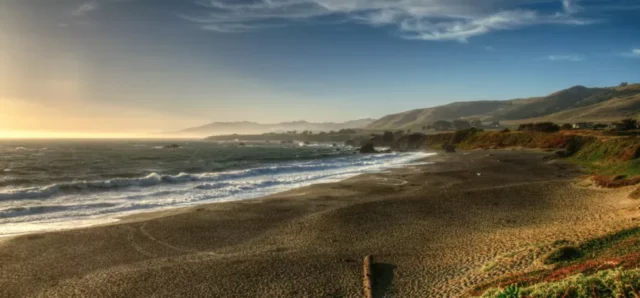
There are so many highlights on the 17-Mile Drive that you could spend all day on it! Most visitors spend around 90 minutes. Allow plenty of time to immerse yourself in its wonders, and don’t resist the temptation to jump out and take pictures of the amazing sights along the way.
Here are just some of the highlights:
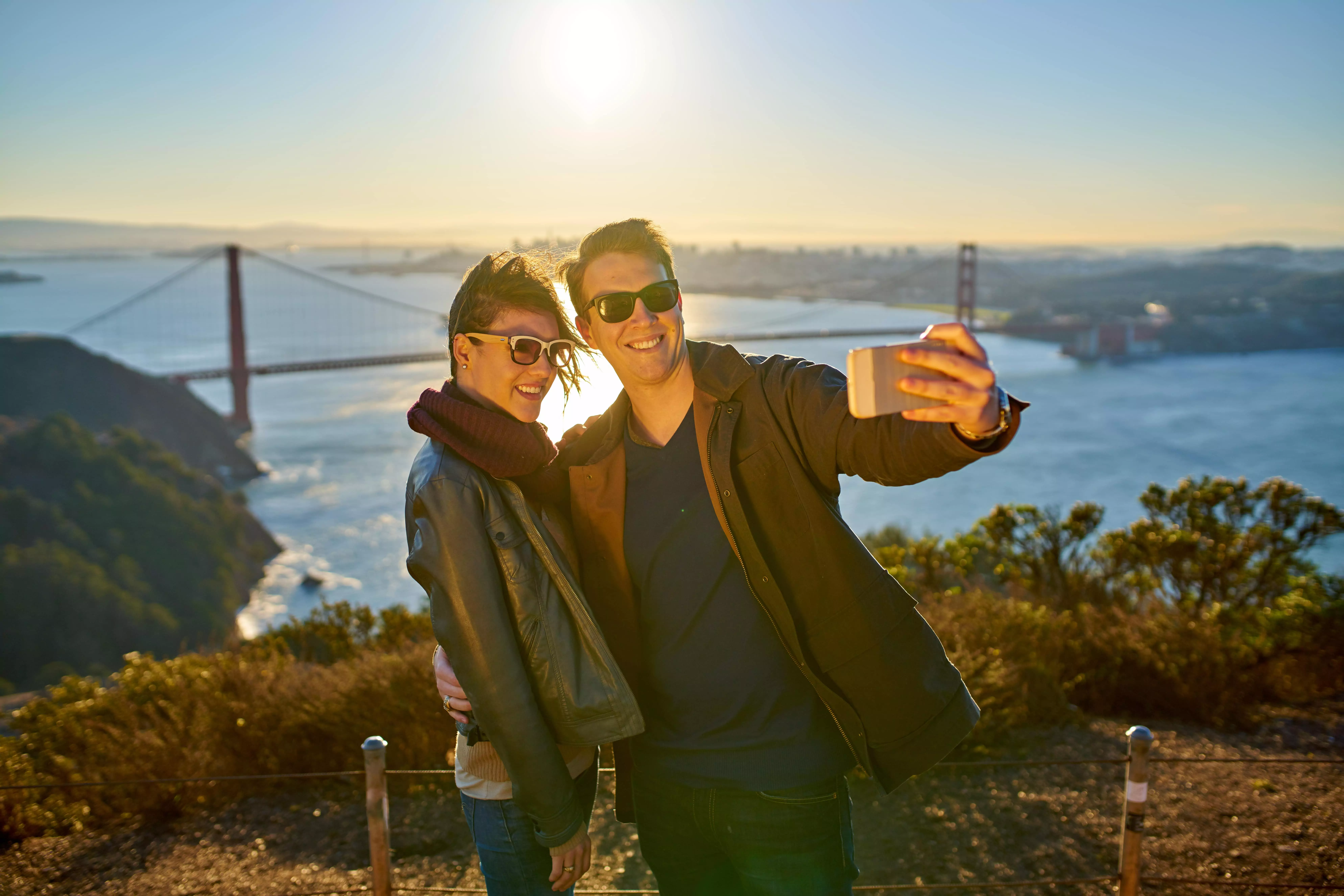
Morning Guided San Francisco Sightseeing Tour
Most complete and entertaining San Francisco city tour available. Stops to explore Golden Gate Bridge, Palace of Fine Arts, Land’s End, and Twin Peaks.
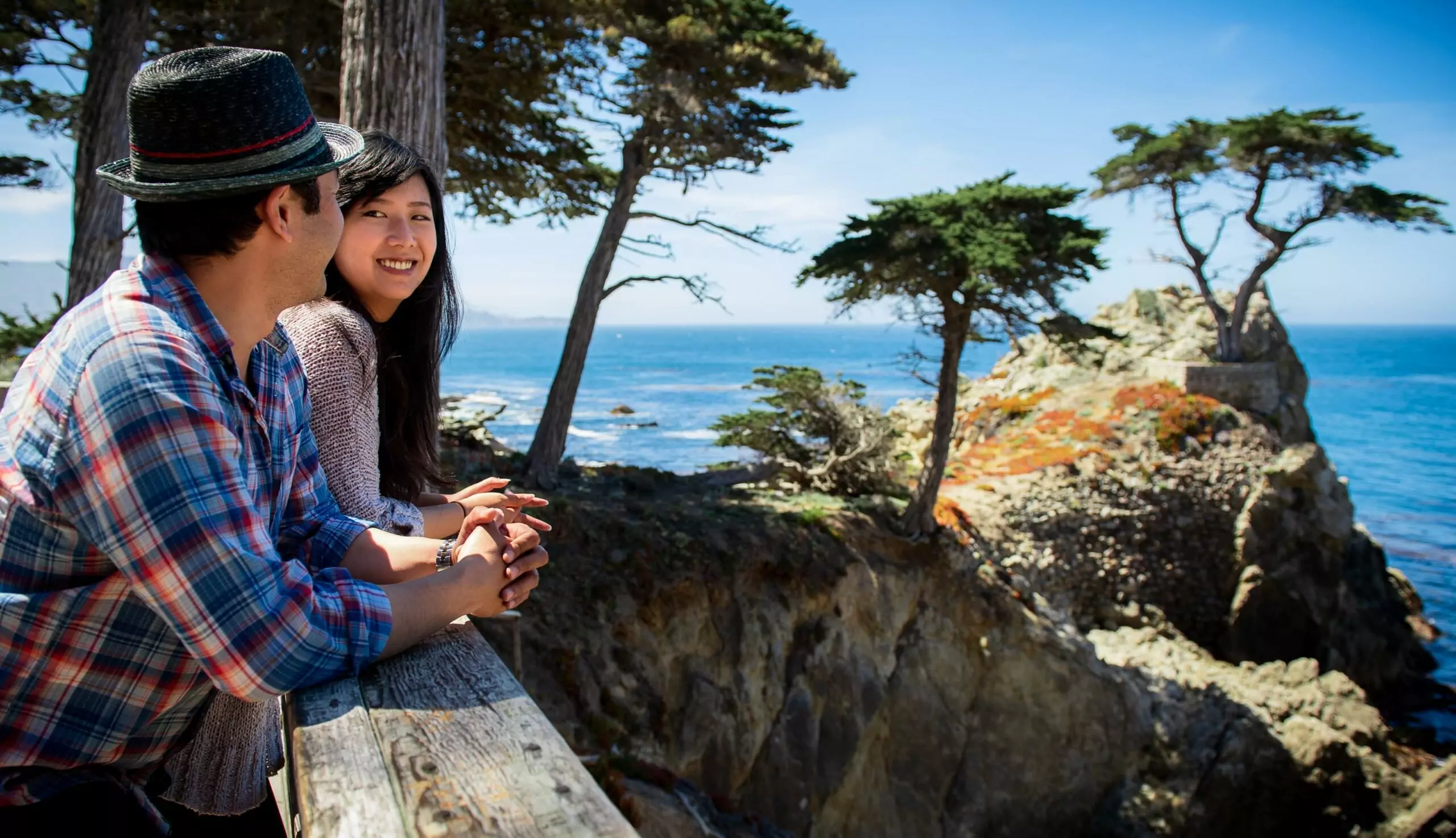
Monterey and Carmel One Day Tour from San Francisco
This day tour hugs the scenic Pacific Coast, then offers free time to explore the Monterey’s Cannery Row and Old Fisherman’s Wharf. Relax along the 17-mile Drive to Pebble Beach and charming Carmel.
Here are just some of the highlights:
Homes of the rich and famous
The route travels through elegant Pebble Beach, CA, known for its celebrity residents. Often hidden behind signature cypress trees and private fences, their grandiose mansions sell for many millions of dollars and often blend perfectly into the stunning landscape.
Unforgettable ocean views
The most beautiful feature of the17-Mile Drive is the access it provides to incredible views at stops like Stillwater Cove, Seal Rock and Spanish Bay. Turbulent waters, craggy rocks, and misty white waves create mile after mile of tantalizing shoreline.
Native wildlife
Spot an amazing variety of wildlife along this stretch of the California coast. Many species of shorebirds make their roost at Bird Rock. Harbor seals and otters swim searching for food in thick kelp beds. Black-tailed deer can be seen scampering across the more forested parts of the area.
Instagram-worthy trees
The Lone Cypress Tree has sat on its cliff-top perch for 250 years. There’s also easy access to Crocker Grove, a 12-acre sanctuary protecting the oldest and rarest Monterey Cypress trees.
Golf courses
There are six world-renowned golf courses along the 17-Mile Drive: Pebble Beach Golf Course, the Links at Spanish Bay, Spyglass Hill, Cypress Point, Poppy Hills, and Del Monte. The courses are popular with visitors and frequently hold celebrity golf tournaments.
All 17-Mile Drive Stops from Monterey to Carmel
So you don’t miss anything, here’s a list of all the must-see vistas and points of interest along the way when entering from the Pacific Grove gate. You can also do the drive in reverse order: simply start from the Samuel F. B. Morse gate off of California State Route 1.
1. Shepherd’s Knoll
This site offers a panoramic view looking down on Monterey Bay. The spot is named for Abraham D. Shepard who built the upper, forested route.
2. Huckleberry Hill
On a clear day, you can see Santa Cruz from this elevated vista point. Writers Robert Louis Stevenson and John Steinbeck enjoyed the native huckleberry shrubs that give the hill its name.
3. The Inn & Links at Spanish Bay
Located next to rolling sand dunes and in the middle of a Scottish-style links golf course, The Inn at Spanish Bay is a luxury hotel with elegant restaurant options that you can dine at along the way.
About Spanish Bay
Spanish explorer Gaspar de Portolà camped here with his ship’s crew in 1769 while exploring the coastline in search of Monterey Bay. This is a great stop to dip your toes in the ocean water or stop for a picnic on the beach!
4. The Restless Sea
One of the most turbulent sections of coastline in Pebble Beach. The churn of the ocean brings food to the local marine life, making it a good place to spot sea mammals and shorebirds.
5. Point Joe
Early European explorers often mistook Spanish Bay for larger Monterey Bay and met disaster on these rocks trying to make their way to shore. Why Joe? In the early 1900s, a man named Joe tended goats and sold trinkets to tourists from his driftwood hut.
6. China Rock
Just down the coast from Point Joe, China Rock was the site of a small Chinese fishing village in the late 1800s.
7. Bird Rock
Uncountable birds leave “deposits” where they rest in the rocks of this ocean refuge. Look for Brandt’s cormorants, pelicans, and sea otters floating in the thick kelp beds. eds.
extra Insider Tip
The is only one restroom along the entire route. Plan ahead!
8. Seal Rock
A great spot to stretch your legs while you picnic, explore tide pools, or hike on the boardwalk toward the colorful Gingerbread House. You won’t believe the number of seals you can see as they sunbathe on this rocky island.
9. Fanshell Overlook
A gorgeous panoramic beach and one of the most popular pupping habitats for California harbor seals on the Central Coast.
10. Cypress Point Lookout
A favored spot for expecting harbor seal mothers. During the spring pupping season, the lookout is closed to give the seals some much-needed privacy. Thanks to the southwest view, the lookout is a great spot to catch a sunset.
11. Crocker Grove
Home to the oldest Monterey Cypress trees, this grove is named after Charles Crocker, a railroad baron who built the original 17-Mile Drive in 1881. Crocker Grove is one of only two native Monterey Cypress forests in the world.
12. Lone Cypress
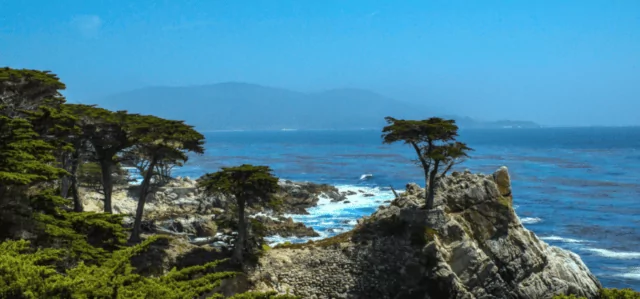
For more than 250 years, the Lone Cypress has occupied this rocky pedestal overlooking the Pacific Ocean. It is so iconic that Pebble Beach adopted the tree as its logo.
extra Insider Tip
This stop on the route has only a few parking spaces. Be patient, it’s worth it!
13. Ghost Tree
This stop at Pescadero Point is haunted by sun-bleached Monterey Cypress trees. It’s also a legendary big wave spot where you can watch surfers deal with swells approaching 50 feet (~15 meters) in the right winter conditions.
14. Lodge at Pebble Beach
Find charming golf-themed shops to browse. Across from the Lodge is a Visitor Center that covers the century-long history of the golf links. Enjoy refreshments at the Terrace Lounge overlooking the historic golf course.
15. Pebble Beach Golf Links
No public course can match the championship pedigree of Pebble Beach Golf Links. If you’re looking to play, a round at Pebble Beach costs more than $500. The other three public courses (Spyglass, Spanish Bay and Del Monte) are a bit more affordable.
16. The Pebble Beach Equestrian Center
Opened in 1924, just five years after Pebble Beach Golf Links, the Equestrian Center is a great place for private horseback riding lessons, guided trail rides along the Pacific Coast, and horse show events.
17. Ford Meadow
Robert F. Ford was a generous donor to the Del Monte Forest Conservancy. The meadow was dedicated to his memory on August 26, 1981.
17-Mile Drive FAQs
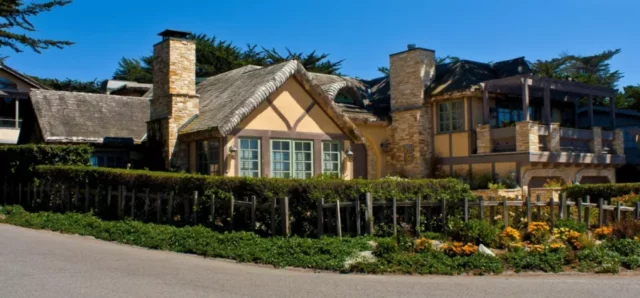
How do you get to the 17-Mile Drive from San Francisco?
From San Francisco, the East Bay or San Jose, navigate your way to Highway 17 in Los Gatos heading toward Santa Cruz. Just north of Santa Cruz, take exit 1B. Continue on Highway 1 toward Monterey for 40 miles until you reach the exit for Highway 68 West, which leads to the Pacific Grove entrance. Total travel time is about 2.5 hours.
How do you get to the 17-Mile Drive from Los Angeles?
To get to the 17-Mile Drive from Los Angeles and all other points in Southern California, make your way to Highway 101 in Paso Robles heading north. Stay on Highway 101 for 85 miles, exiting at Highway 68 West. Continue on 68W to the Pacific Grove gate, about 32 miles. Travel time is about 5-6 hours.
Where is the best starting point for the 17-Mile Drive?
The best starting point for the 17-Mile drive is the Pacific Grove entrance, but you can also enter from CA Highway 1 (the Sam F.B. Morse Gate), which is the most frequently used gate. From Pacific Grove, drive south and exit through the Carmel gate. You can also do this trip in the reverse order.
How many stops are there on the 17-Mile Drive?
There are at least 17 stops along the 17-mile route — more if you count every restaurant, lodge, or golf course. Each point of interest has easy access with paved parking for cars and RVs.
How long does it take to do the 17-Mile Drive?
Most visitors spend around 90 minutes on the 17-Mile Drive, but it can take even longer depending on how often you stop. Even though the drive is only 17 miles long and could be driven much faster, allow for some extra time to stop and admire the many wonders along its route.
How much does it cost to take the 17-Mile Drive in Monterey?
As of 2025, it costs $12.25 per vehicle to take the 17-Mile Drive in Monterey, which you can pay at any of the five entrance gates. You can get reimbursed if you make a purchase of $35 or more at shops and restaurants along the way. You can find the current toll pricing on the official website here.
When you book with a tour company like Extranomical, your toll is included in the price of your trip. In addition, you’ll save on gas – more cost-effective and better for the environment!
When is the best time to take the 17-Mile Drive in Monterey?
Fall and spring are the best times to take the 17-Mile Drive, because there’s usually less coastal fog and you’ll have better views. Avoid going during the Pebble Beach Pro-Am golf tournament in February, the Pebble Beach Food and Wine Festival in April, and the Pebble Beach Concours d’Elegance auto show in August. Otherwise, you can enjoy it any time of year.
Are there restaurants on the 17-Mile Drive?
Yes, there are plenty of restaurants on the 17-Mile Drive. Elite restaurants requiring a reservation include The Inn at Spanish Bay and The Lodge at Pebble Beach. More casual options are the Stillwater Bar & Grill (seafood), The Tap Room (classic steakhouse), The Bench (grill), and Gallery Cafe (casual contemporary).
Where can you picnic along the 17-Mile Drive?
The best picnic spots on the 17-Mile Drive are near Seal Rock. You can buy supplies at the 5th Avenue Deli in downtown Carmel, or the Pebble Beach Market next to The Lodge at Pebble Beach.
What should you bring along when taking the 17-Mile Drive?
Bring your phone or camera for pictures, and a pair of binoculars for spotting birds, harbor seals, and sea otters. Bring a light jacket or a long-sleeved top – it can be cool and windy along the coast!
What is the weather like on the 17-Mile Drive?
The weather on the 17-Mile Drive is generally mild but winter storms can make it feel wet and chilly. The weather can vary greatly along the way: on the same day, it can be 80°F (27°C) and sunny in Monterey and a windy 65°F (18°C) at Spanish Bay.
Where can you get a map of the 17-Mile Drive?
You can get a brochure with extensive information and an easy-to-follow map at any of the official entry gates. The route is also clearly marked: just follow the dashed red line on the roadway and posted signs along the route.
What is the history of the 17-Mile Drive in Monterey?
Over 100 years ago, this route was a trail for covered wagons carrying guests from hotels to picnic grounds along Pebble Beach. Today, visitors continue to enjoy its crashing waves and pristine views.